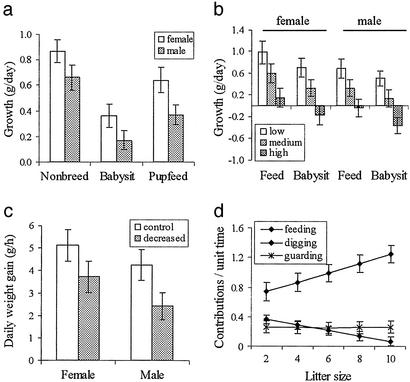Figure 1.
Effects of breeding period and contribution to cooperation on helper growth rates (g/day). (a) Breeding period (χ2 = 39.57, df = 2, P < 0.001) and helper sex (χ2 = 21.56, df = 1, P < 0.001) significantly influenced growth rates, and there was a nonsignificant tendency for males to grow more slowly than females during periods of cooperation (χ2 = 4.80, df = 2, P = 0.091). (b) Helpers that contributed more to cooperation had slower growth rates (χ2 = 37.72, df = 5, P < 0.001), and this tended to be especially true of males (χ2 = 14.69, df = 5, P < 0.012; “Feed” refers to periods of pupfeeding). (c) Experimental decreases in helper:pup ratios caused helpers to have reduced rates of weight gain (g/h; paired t test, t9 = 3.41, P = 0.009). (d) Increases in litter size were positively associated with increases in the proportion of food items found, which helpers gave away (χ2 = 9.45, df = 1, P = 0.002); negatively associated with contributions to social digging (F1,87 = 8.60, P = 0.004); and not associated with contributions to raised guarding (F1,73 = 0.25, P = 0.62). Contributions to pupfeeding are shown on a per-hour basis, whereas contributions to social digging and raised guarding are shown on a 3-h basis.

